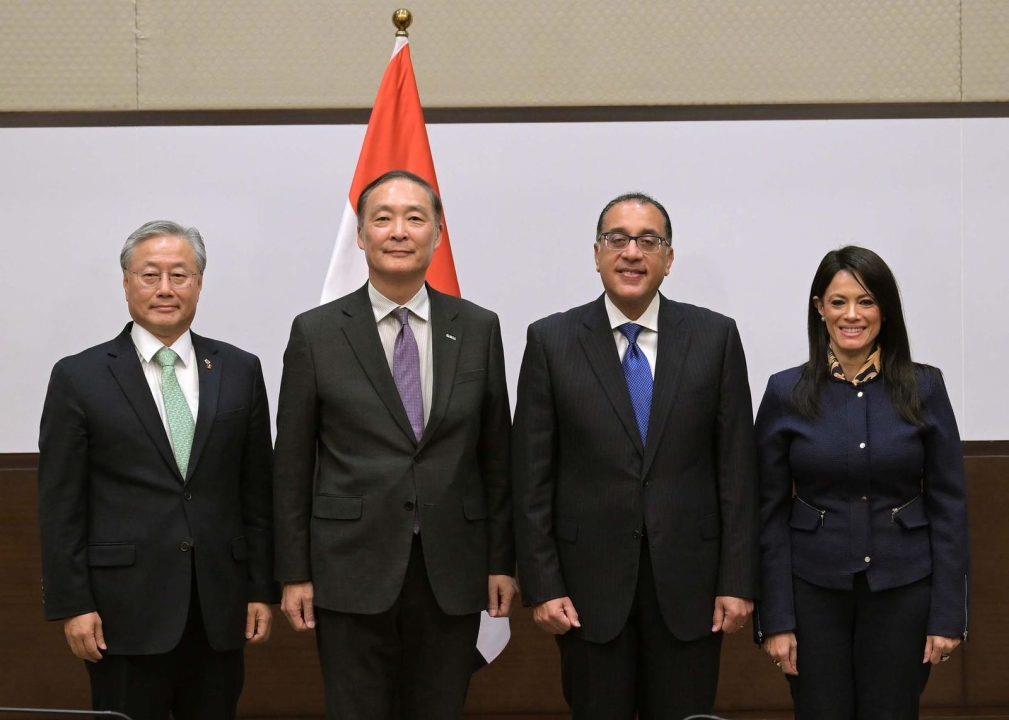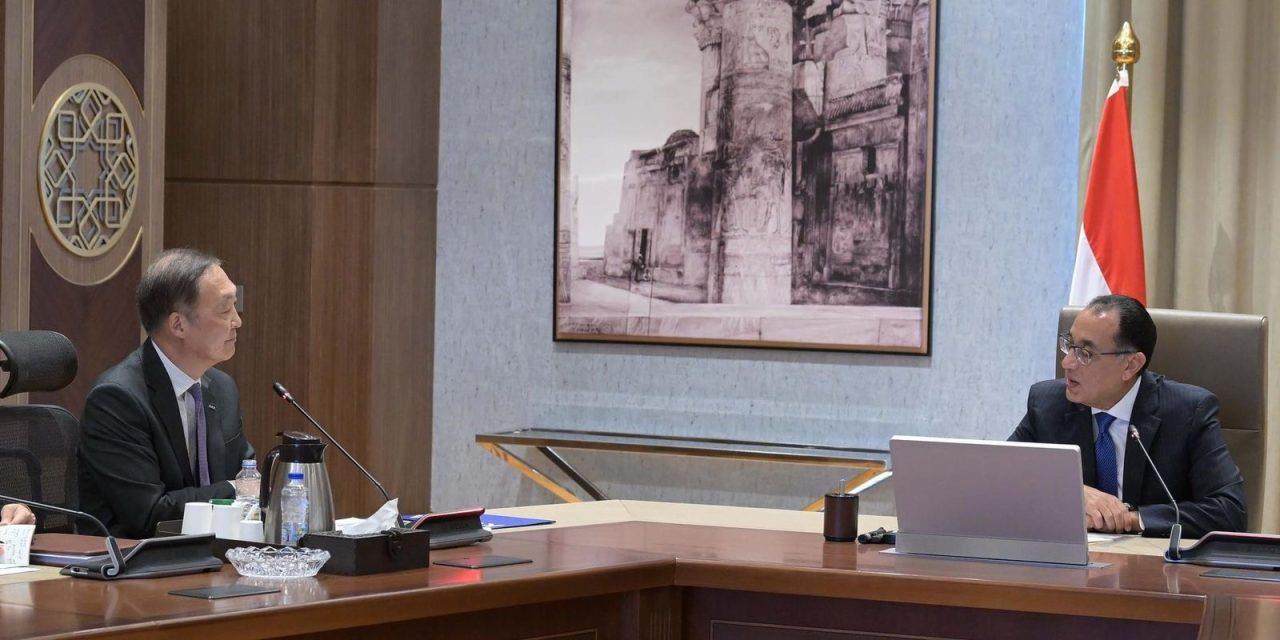(MENAFN- Daily News Egypt) What are your Cairo visit's expected outcomes? Which of Egypt's officials have you met?
Thanks for the warm welcome. This is my first official visit to Egypt as President of KOICA, and in fact the first visit to Egypt made by a KOICA president in recent years
The purpose of my visit is to mark KOICA's project to support the digitization of public procurement services in Egypt (2022-2026, $7.9m).
To introduce and promote Egypt's newly developed e-procurement system supported by KOICA, we will hold held a briefing ceremony for high-level stakeholders on November 21.
On the occasion of my visit, I had the privilege of meeting with Prime Minister Mostafa Madbouly, and Minister of Planning, Economic Development, and International Cooperation Rania Al-Mashat, During our productive talks, we reaffirmed our shared solid commitment to strengthen the KOICA-Egypt partnership and exploring constructive ways to realize this.
With the same purpose I will meet with the Minister of Finance Ahmed Kouchouk, who will also co-host of the event for the newly established e-procurement system.
In your opinion, what distinguishes Egypt in its relation with Korea? And how do you evaluate the Korea-Egypt relationship, especially as the next year marks this partnership's 30th anniversary?
Egypt is strategically located at the crossroads linking the Middle East, Africa and Europe. It is home to a dynamic and vibrant young population. The Egyptian government has demonstrated a clear vision for sustainable growth through national initiatives such as 'Egypt Vision 2030,' which emphasizes innovation-driven economic development, digital transformation, and green energy projects.
All these factors provide precious opportunities for investment, cultural exchanges, and development cooperation, in addition to joint action to address global agenda. Moreover, for the last 30 years, both countries have made tremendous achievements in terms of development.
In 2021, the Korean government chose Egypt as a priority development partner, so why did Korea choose Egypt? And how did this impact the bilateral relations, and KOICA's activities in Egypt?
Egypt's regional presence, coupled with its extensive FTA network and youthful population, positions it as a vital partner for regional and global development. The country's growth potential, bolstered by its dynamic leadership and expanding economy, makes it a natural choice for strengthened cooperation. Since the 2016 Korea-Egypt Joint Declaration and the 2022 Korea-Egypt summit, our two nations have been working to deepen collaboration in transportation, energy, ICT, and education.
Recognizing Egypt's pivotal role, the Korean government designated it as a priority partner for Official Development Assistance (ODA) in 2021 . This has catalyzed initiatives focused on education, public administration, transportation, environmental sustainability, and digital transformation.
How do you see Egypt's role and contributions to the success of the 2024 Korea-Africa Summit?
In May, ahead of the summit, Prime Minister Madbouly convened a strategic meeting with representatives from 15 prominent Korean companies operating in Egypt including Samsung, LG and Hyundai, to discuss ways to bolster economic and social cooperation between our two countries. During the summit, Minister of International Cooperation Rania Al-Mashat headed the Egyptian delegation to Korea, and both governments produced fruitful outcomes on common areas of interest ranging from development cooperation to business. Thanks to Egypt's participation, the 2024 Korea-Africa Summit served as an opportunity to further expand and accelerate our partnership.

What are KOICA's priorities in terms of its cooperation with Egypt? What are the development cooperation sectors that need to be bolstered?
KOICA is committed to fostering mutual prosperity and shared interests through strengthened development cooperation. Our collaborative efforts focus on key areas such as economic and social development, youth empowerment, human capital development, climate change mitigation, and the promotion of peace and justice. In Egypt, we believe that development cooperation can serve as a catalyst for economic growth by enhancing technical education, empowering youth, and improving government services through digital efficiency. Additionally, our work aims to promote social inclusion, particularly for women and vulnerable groups, including refugees.
How many projects has KOICA implemented in Egypt since its launch in the country? What is the total estimated cost of these projects?
Since the establishment of the KOICA Egypt Office in 1998, we have implemented around 30 projects mainly in the areas of technical education, industrial development, and improvement of government services. An accumulated total of around 2,000 Egyptian government officials have visited Korea to participate in capacity building training programs; we have also fostered some 140 master's degree graduates. Prominent alumni of the training program include Prime Minister Madbouly, who attended KOICA's urban development and planning program in 2001. About 320 long-term KOICA volunteers have contributed to community development and youth empowerment in Egypt. In sum, KOICA has provided a total of $95m in support to Egypt, with plans to expand our cooperation in coming years.
What are the key pillars of your programmes and projects in Egypt?
KOICA's Country Plan for cooperation with Egypt focuses on three priority pillars: providing technical education for youth, supporting the digitalization of government services and systems, and implementing programs to combat gender-based violence, empower women, and support vulnerable groups.
KOICA is known for being so advanced in technology, so in your opinion how the projects of KOICA have supported Egypt in being a digitalized country?
Digital transformation has a profound impact on people's lives. Korea has accumulated a wealth of experience and expertise in the digital transformation of government services, digital government being a key area of KOICA's ODA (Official Development Assistance) projects. Korea itself has emerged as a global leader in digital government, consistently ranking highly in international assessments by the World Bank, UN, OECD.
Egypt, with its growing need for digitalization and strong potential in policy, infrastructure, industry, and the private sector, is well-positioned for progress. The KOICA Egypt office is currently developing a 'Digital Transformation Program Result Framework,' set to launch next year. This framework will outline a long-term partnership strategy between Korea and Egypt, identifying key projects to support Egypt's 'Digital Egypt' initiative.

As we know that gender equality is a core pillar in KOICA's projects, so how do you think these gender projects impact the women empowerment in Egypt?
We aim to support all women and girls, including refugees, who are affected by gender-based violence and face discrimination that limits their full economic and social participation. In partnership with the National Council of Women of Egypt and UN agencies such as UNFPA, UN Women, WFP, and UNHCR, we are implementing projects to prevent and respond to violence in families, schools, workplaces, and communities. Our efforts empower women and girls to become resilient and self-reliant, contributing to the full realization of their potential and building a more inclusive, prosperous nation.
Korea is advanced in the technical and educational education, how could Egypt benefit from this experience?
The Egyptian labor market has been increasingly in demand of technical education graduates equipped with not only theoretical knowledge but also practical skills that match fast-changing industrial trends in Egypt. Our strategy is to engage more deeply with private sector partners in key aspects of technical education, including joint development of curriculum, long-term internships, and other forms of university-industry cooperation.
Through KOICA's support, the students of Beni-Suef Technological University, have benefited from an internship program with Samsung's local branch. Beni-Suef Technological University is now collaborating with KOICA and Hyundai Rotem, which is actively participating in the Egyptian government's nation-wide railway system transformation projects.
Could you talk about KOICA's upcoming projects and programs in the near and medium term, and the key areas of focus?
Given Egypt's potential and challenges, including pressing issues such as climate change, food security, population growth, and the global trend toward digital transformation, there are significant opportunities for deeper cooperation between Korea and Egypt through joint initiatives.
KOICA has recently launched several signature programs focusing on key development areas such as digital, health, and agriculture across Africa. In this vein, the KOICA Egypt Office is collaborating with relevant ministries on the 'Inclusive Digital Education Access' project, which aims to build the digital competencies of both teachers and students, as well as improve digital learning management skills for basic education.
Green development is another important part of our focus for Egypt. KOICA has long-standing partnerships with technical education institutions in Egypt. We are currently working with the Productivity Vocational Training Department (PVTD) under the Ministry of Transport and Industry on a project to enhance the quality of vocational training for automotive maintenance, especially for eco-friendly vehicles including LNG and electric cars.
How do you envision the future of the relationship between KOICA and Egypt in terms of the development cooperation?
Africa, as the youngest and fastest-growing continent, faces pressing challenges such as climate change, food insecurity, and health crises. Within this context, Egypt plays a strategic and influential role as a leader in the region.
The recent Korea-Africa Summit reaffirmed Korea's commitment to expanding development cooperation, including a pledge to provide $10 billion in ODA by 2030 and initiatives like the Tech4Africa program to drive digital innovation and opportunities for youth. Within this broader framework, Egypt stands out as a model for successful development initiatives, including digital transformation and vocational training.
Looking ahead, the relationship between KOICA and Egypt will continue to grow, with an emphasis on leveraging Egypt's achievements to promote South-South cooperation. The MOU between KOICA and the Egyptian Agency of Partnership for Development (EAPD) is a testament to this vision, as it aims to share Egypt's development successes with neighboring nations. We anticipate expanded collaboration in areas like green technology, digital education, and public governance, with the positive impacts extending across Africa.
MENAFN23112024000153011029ID1108917037